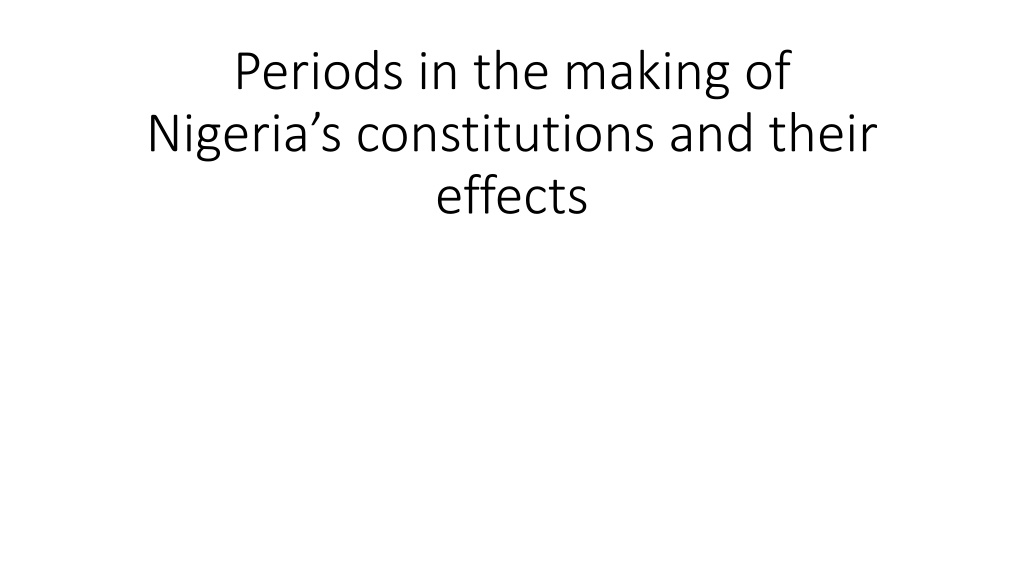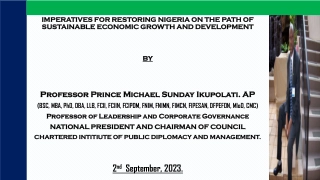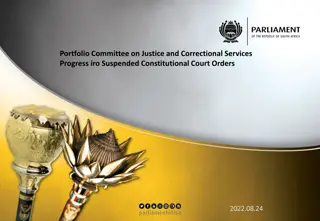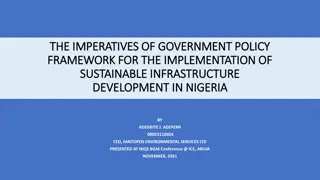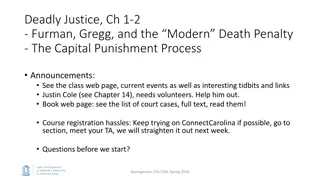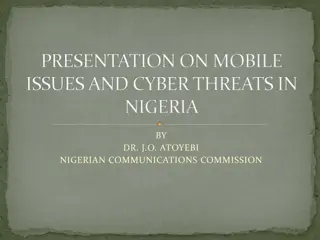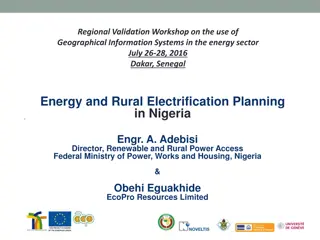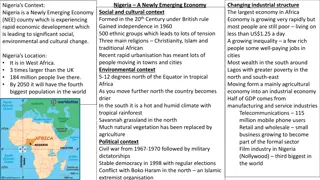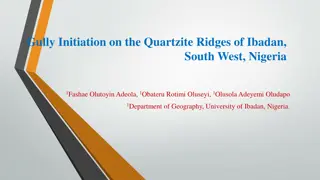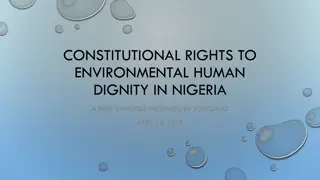The Evolution of Nigeria's Constitutional Development
Explore the pivotal periods in the making of Nigeria's constitutions - from colonial and military eras to democratic governance and the establishment of republics. Uncover how each phase shaped the nation's constitutional landscape, reflecting unique characteristics and shifts in governance.
Download Presentation

Please find below an Image/Link to download the presentation.
The content on the website is provided AS IS for your information and personal use only. It may not be sold, licensed, or shared on other websites without obtaining consent from the author. Download presentation by click this link. If you encounter any issues during the download, it is possible that the publisher has removed the file from their server.
E N D
Presentation Transcript
Periods in the making of Nigeria s constitutions and their effects
Two broad and Common periods of Constitution Making Broadly speaking, Nigeria s constitutions have been made under two major periods 1. Colonial Era 2. Military Era Each of these periods have bestowed on Nigeria s constitutions the various characters that accompany the era.
For instance, the constitutions under colonialism have been such that they are made for subjects, and not citizens; they are characterised participation of Nigerians in politics Also, constitutions under characterised by retaining the monopoly of force over the people; and the setting up of certain institutions as if they are above the law as well as having them as instruments of oppression (which is a major feature of military rule) by a controlled military rule have been
A third period? Although, it makes sense to discuss all the constitutions as being made under the military and the colonialist, yet truth is that there is a third very uncommon period which did not repeat itself in Nigeria. This is the period of democratic governance. The 1963 constitution is an example here. This constitution sought to break the ties with Britain as being the parent country and made effort to localise politics and Nigeria's sovereignty. Two major features of this constitution are that 1, it turned Nigeria into a republic, and 2., it shed the parliamentarian style of British model of governance and adopted the American Presidential style
Constitutions of the Republics these are the 1963, 1979, 1993, and the 1999 Constitutions. These constitutions were made during the post-independence period and the military era. Other than 1963 constitution, which was made under civilian rule, others were made during military rule These constitutions were made in order to establish constitutionalism for the republics, which is a way of talking of civilian/democratic rule.
More Periods Even though we have just two broad periods we may, through historical analysis of what happened before the making of the constitution ( as in what led to them); and what the constitution is expected to achieve, come up with more periodisation of the making of Nigeria s constitutions.
Pre-Amalgamation constitution Colonial Rule Constitutions Pre-Independence Constitution Post Independence Constitution Military Rule Constitutions
Pre-Amalgamation constitution Nigeria's first constitutions were enacted by order in council during the colonial era, when Nigeria was administered as a Crown Colony. The constitutions was of 1913, but it came into effect on 1 January 1914). This constitution is shaped by the desire of the British to amalgamate the southern and northern parts of the country such that the wealth of the south can serve the north and aimed at and imposition of taxes in areas where such practice was not known and in addition having indirect rule
The Period of Colonial Rule This is shaped by experience of the colonialists in their interactions with their subjects
Pre-Independence Constitution This independence and the need to provide constitutionalism for the country constitution is shaped by the struggle with Nigeria s
Post Independence Constitution Much has been said about this This is to refer to the attempt of Nigerians to domesticate Nigeria s politics and restructure along lines convenient for them and as a result of the need to govern the country due to the experience they have gathered in the three years they have been ruling. Also the crises in the various part of the country were instrumental in shaping this constitution
Military Rule Constitutions Please note that a major effect of military rule is that the constitution is suspended and rule is by decree 1. shaped by the need to restore democracy 2. influenced by elitism and the fear of loosing relevance
A major problem that Nigerias democracy has is that its grundnorm, the constitution is not of the people since Nigerians have had little or no say in the way(s) their government is operated. The constitution, which is the supreme source of power, is not made by the people
for a constitution to perform its noble role as the foundation or basis of order in society, the processes leading to its promulgation would have to be all-inclusive, giving every individual, group or interest in society the opportunity to participate in deciding what the founding charter of the society should be,
Nigeria, in the real sense, cannot assert that it has a constitution. It is plain that the act of constitution making in Nigeria has been either under the colonialists or the military rulers. The people have had no opportunity to sit together to debate the conditions under which they want to live together, resolve their grievances and allay their fears and have thus been denied a management of their political destiny say in determining the
